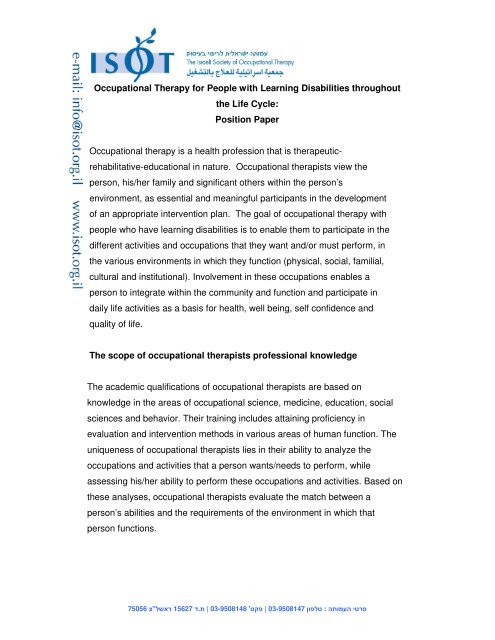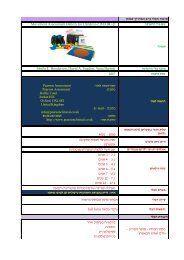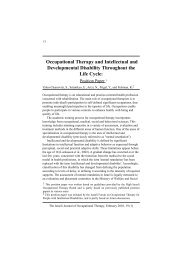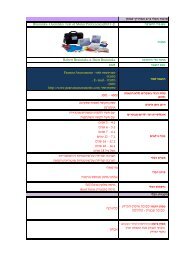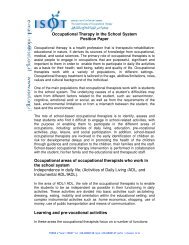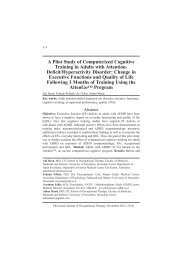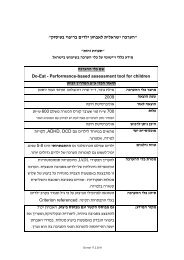Occupational Therapy for People with Learning Disabilities ...
Occupational Therapy for People with Learning Disabilities ...
Occupational Therapy for People with Learning Disabilities ...
- No tags were found...
You also want an ePaper? Increase the reach of your titles
YUMPU automatically turns print PDFs into web optimized ePapers that Google loves.
ת|<br />
<strong>Occupational</strong> <strong>Therapy</strong> <strong>for</strong> <strong>People</strong> <strong>with</strong> <strong>Learning</strong> <strong>Disabilities</strong> throughout<br />
the Life Cycle:<br />
Position Paper<br />
<strong>Occupational</strong> therapy is a health profession that is therapeuticrehabilitative-educational<br />
in nature. <strong>Occupational</strong> therapists view the<br />
person, his/her family and significant others <strong>with</strong>in the person’s<br />
environment, as essential and meaningful participants in the development<br />
of an appropriate intervention plan. The goal of occupational therapy <strong>with</strong><br />
people who have learning disabilities is to enable them to participate in the<br />
different activities and occupations that they want and/or must per<strong>for</strong>m, in<br />
the various environments in which they function (physical, social, familial,<br />
cultural and institutional). Involvement in these occupations enables a<br />
person to integrate <strong>with</strong>in the community and function and participate in<br />
daily life activities as a basis <strong>for</strong> health, well being, self confidence and<br />
quality of life.<br />
The scope of occupational therapists professional knowledge<br />
The academic qualifications of occupational therapists are based on<br />
knowledge in the areas of occupational science, medicine, education, social<br />
sciences and behavior. Their training includes attaining proficiency in<br />
evaluation and intervention methods in various areas of human function. The<br />
uniqueness of occupational therapists lies in their ability to analyze the<br />
occupations and activities that a person wants/needs to per<strong>for</strong>m, while<br />
assessing his/her ability to per<strong>for</strong>m these occupations and activities. Based on<br />
these analyses, occupational therapists evaluate the match between a<br />
person’s abilities and the requirements of the environment in which that<br />
person functions.<br />
פרטי העמותה : טלפון | 03-9508147 פקס' 03-9508148 .ד 15627 ראשל"צ 75056
ת|<br />
<strong>Occupational</strong> therapies perspective on learning disabilities (LD)<br />
The occupational therapy profession perspective integrates the theoretical<br />
basis of the profession <strong>with</strong> the current, accepted and common definition of<br />
LD in the world together <strong>with</strong> the official definition of LD in Israel... The<br />
prevalent definition is as follows:<br />
“<strong>Learning</strong> disabilities is a general term that refers to a heterogeneous<br />
group of disorders manifested by significant difficulties in the acquisition<br />
and use of listening, speaking, reading, writing, reasoning, or<br />
mathematical skills. These disorders are intrinsic to the individual and<br />
presumed to be due to central nervous dysfunction. They may occur at<br />
any stage throughout the life cycle. Although learning disabilities may<br />
occur concomitantly <strong>with</strong> other limiting conditions (e.g., sensory<br />
impairment, mental retardation, emotional and social disturbance,<br />
psychiatric disorder), or external conditions (such as cultural differences,<br />
insufficient or inappropriate instruction), they are not the direct result of<br />
those conditions” (NJCLD, 1990/1994).<br />
In concert <strong>with</strong> the theoretical base of the profession, occupational therapists<br />
are aware that learning disabilities differ in their severity and in the way they<br />
manifest in different individuals. Likewise, learning disabilities can affect not<br />
only academic per<strong>for</strong>mance but also the various functions in which the<br />
individual is involved. There<strong>for</strong>e, occupational therapists assist people <strong>with</strong><br />
learning disabilities in coping <strong>with</strong> the effects of the disability on various<br />
activities and occupations, such as academic studies, activities of daily living,<br />
social participation, play, leisure, work, military service, driving and family life.<br />
Moreover, occupational therapists deal <strong>with</strong> the early identification and<br />
prevention of difficulties in functioning and in learning.<br />
The work of occupational therapists among people <strong>with</strong> learning disabilities is<br />
usually carried out as part of a multidisciplinary team, <strong>with</strong> each profession<br />
contributing its unique knowledge and specialization.<br />
פרטי העמותה : טלפון | 03-9508147 פקס' 03-9508148 .ד 15627 ראשל"צ 75056
ת|<br />
The occupational therapy evaluation process among people <strong>with</strong><br />
learning disabilities<br />
The occupational therapy evaluation is an important component of the<br />
multidisciplinary assessment process. The purpose of this evaluation is to<br />
identify the areas of strengths and weakness of individuals <strong>with</strong> learning<br />
disabilities in per<strong>for</strong>ming various activities and occupations and analyzing the<br />
tasks these individuals need to per<strong>for</strong>m. The process of evaluation starts <strong>with</strong><br />
an interview <strong>with</strong> the person and /or his/her family in order to gather<br />
in<strong>for</strong>mation about the person’s occupational history, wishes and needs,<br />
routines and habits, areas of interest and values. This in<strong>for</strong>mation helps<br />
identify the individual’s strengths, weaknesses and list of priorities regarding<br />
the person’s various activities.<br />
The occupational therapist then chooses a standardized assessment tool to<br />
assess the underlying causes of the individual’s difficulties and the various<br />
demands of the environment in which he/she functions. The source of the<br />
difficulties may lie in various deficits in sensory, motor, cognitive functions, as<br />
well as other areas. The process is completed by integrating the findings of<br />
the interview, observations and standardized assessments to <strong>for</strong>m a<br />
comprehensive picture of the individual's capacities, the source of his/her<br />
difficulties and the manner in which the person copes <strong>with</strong> the environmental<br />
demands.<br />
Intervention of occupational therapy among individuals <strong>with</strong> learning<br />
disabilities<br />
<strong>Occupational</strong> therapy intervention approaches and methods <strong>for</strong> individuals<br />
<strong>with</strong> learning disabilities take into account the person him/herself <strong>with</strong> respect<br />
to the his/her abilities and disabilities and learning style, as well as to the<br />
environment in which the intervention is carried out. In addition, the<br />
פרטי העמותה : טלפון | 03-9508147 פקס' 03-9508148 .ד 15627 ראשל"צ 75056
ת|<br />
approaches are adapted <strong>with</strong> respect to the occupations that individuals want<br />
and need to per<strong>for</strong>m in the environments in which they functions.<br />
On the basis of an analysis of the factors mentioned, occupational therapists<br />
suggest an intervention program that focuses on the person, the task to be<br />
per<strong>for</strong>med and the environment in which it is to be per<strong>for</strong>med. <strong>Occupational</strong><br />
therapy intervention may be carried out as direct, individual therapy; through a<br />
group process (group therapy); and / or by consulting <strong>with</strong> the individuals,<br />
their families and the other people in their environment (educational teams,<br />
work teams, etc.).<br />
The intervention is directed towards adapting the activities and / or the<br />
environment of the individual in order to enable him/her to realize his/her full<br />
potential.<br />
The occupational therapy evaluation and intervention are carried out in<br />
various environments, such as in a clinic and/or in the person's natural<br />
environment (at home, class, playground, work place, etc.).<br />
<strong>Occupational</strong> therapy areas of focus <strong>with</strong> people <strong>with</strong> learning<br />
disabilities<br />
The occupational therapy evaluation and intervention process <strong>for</strong> individuals<br />
<strong>with</strong> learning disabilities occurs throughout the life cycle - from early childhood<br />
until late adulthood - in a variety of occupational areas:<br />
• Independence and participation in activities of daily living:<br />
Evaluating and improving the person’s ability to per<strong>for</strong>m self-care (e.g.,<br />
dressing, eating and personal hygiene), as well as to acquire the habits<br />
and skills required <strong>for</strong> instrumental activities of daily life (IADLs) <strong>with</strong>in the<br />
home and community environment (such as the efficient use of means of<br />
פרטי העמותה : טלפון | 03-9508147 פקס' 03-9508148 .ד 15627 ראשל"צ 75056
ת|<br />
communication devices, household management and the use of public<br />
transportation or driving).<br />
• <strong>Learning</strong>: Evaluating and improving the individual's ability to cope <strong>with</strong><br />
the demands of different academic settings through efficient in<strong>for</strong>mation<br />
processing, improving organizational abilities, developing strategies,<br />
improving writing skills, and so <strong>for</strong>th.<br />
• Military service:(Note: Military service is obligatory <strong>for</strong> Israeli youths after<br />
they graduate from high school) Preparation, support and guidance <strong>for</strong><br />
the soldier <strong>with</strong> learning disabilities in adapting and coping <strong>with</strong> the<br />
demands of the army system (<strong>for</strong> example, through consulting <strong>with</strong> the<br />
individual in selecting a role that suits his/her abilities, providing strategies<br />
<strong>for</strong> punctuality and organizing his/her personal belongings and military<br />
equipment).<br />
• Work: Evaluation and improvement of work skills and habits to allow <strong>for</strong><br />
integration into the work place (e.g., punctuality, work relationships,<br />
complying <strong>with</strong> the rules and norms of the work place), consultation<br />
regarding selecting a suitable occupation and recommendations regarding<br />
the accessibility of the work environment.<br />
• Play and leisure: The evaluation of play skills and leisure patterns, the<br />
cultivation and development of leisure opportunities, fostering internal<br />
control and satisfaction from play and leisure activities (e.g., guidance<br />
regarding adapting activities/clubs to suit the needs and strengths of the<br />
individual).<br />
• Social participation :Evaluation and development of social skills (e.g.,<br />
teaching strategies <strong>for</strong> self-expression and personal empowerment,<br />
helping improve interpersonal interactions as well as in identifying and<br />
complying <strong>with</strong> accepted social codes and norms).<br />
פרטי העמותה : טלפון | 03-9508147 פקס' 03-9508148 .ד 15627 ראשל"צ 75056
ת|<br />
Development and improvement of basic skills that constitute a basis <strong>for</strong><br />
learning<br />
Cognitive skills: Training and improvement of attention, perceptual and<br />
memory processes, in<strong>for</strong>mation processing as well as training and<br />
improvement of ability to classify and generalize.<br />
Meta-cognitive skills and self-management functions (Executive<br />
Functions): Enhancing awareness and acquisition of knowledge about the<br />
individual’s personal learning and thinking processes; knowledge relating to<br />
the task's requirements and strategies to cope <strong>with</strong> different tasks and<br />
teaching him/her to apply them. In addition, teaching methods needed to<br />
anticipate, plan and use feedback when executing various actions. All of these<br />
help individuals improve their ability to solve problems. One point of emphasis<br />
of occupational therapists in this sphere is the organization and selfmanagement<br />
in time and space, such as planning and maintaining a daily<br />
schedule while balancing between the various activities, organization in<br />
preparations <strong>for</strong> travel, managing the routine organization of personal<br />
belongings and spatial orientation in different locations.<br />
Development of specific skills necessary <strong>for</strong> learning: These include the<br />
development and improvement of writing skills – developing the ability to write<br />
<strong>with</strong>in a reasonable amount of time <strong>with</strong>out investing unnecessary energy,<br />
such that the written document is legible and comprehensible. Writing skills<br />
are needed <strong>for</strong> writing tasks that include copying, dictation, preparing<br />
homework, and the like. Intervention includes direct intervention as well as<br />
recommendations <strong>for</strong> adaptation to the school’s requirements and of various<br />
accessories (e.g., type of pencil, notebook, laptop computer and<br />
accompanying accessories), as well as teaching keyboarding skills.<br />
פרטי העמותה : טלפון | 03-9508147 פקס' 03-9508148 .ד 15627 ראשל"צ 75056
ת|<br />
Development of compensatory techniques<br />
<strong>Occupational</strong> therapists are involved in developing compensatory techniques<br />
to support the function of individuals <strong>with</strong> LD, including:<br />
The use of assistive devices and technology - such as a computer, an<br />
adapted keyboard, an electronic calendar, time-tables (<strong>for</strong> use at home, in<br />
school and at the work place), a slanted writing board, wide pencil grips and<br />
others.<br />
Adaptation of the task - such as reducing the length of written tasks to suit a<br />
student’s endurance, adapting the time required <strong>for</strong> learning/working<br />
according to the person’s attention span, adapting the instructions <strong>for</strong> an<br />
activity and adapting the rules of a game.<br />
Adaptation of the environment - such as structuring and designing the<br />
study and work environment in accordance <strong>with</strong> ergonomic principles, which<br />
relate to matching a person’s characteristics to the demands of his/her work<br />
environment. Examples include adjusting the height of the chair and the table,<br />
the type of pen, the placement of the student’s seat in the classroom and at<br />
the workplace, adjusting his/her computer set up, etc.<br />
Intervention <strong>for</strong> co-occurring deficits that accompany learning<br />
disabilities<br />
Research findings report that in about 50% of the population coping <strong>with</strong><br />
learning disabilities, there are accompanying deficits such as attention deficit<br />
hyperactivity disorder (ADHD), developmental coordination disorder (DCD)<br />
and sensory modulation disorder (SMD). In the therapeutic intervention of<br />
individuals <strong>with</strong> learning disabilities, occupational therapists place great<br />
importance on simultaneously addressing additional co-occurring deficits.<br />
Attention deficit hyperactive disorder (ADHD) – occupational therapists<br />
help by increasing the awareness of individuals and their significant others to<br />
פרטי העמותה : טלפון | 03-9508147 פקס' 03-9508148 .ד 15627 ראשל"צ 75056
ת|<br />
their difficulties in attention and the manner in which this influences their<br />
function. Therapists also guide the individual in developing strategies <strong>for</strong><br />
regulating their level of arousal, modulating their responses and applying selfcontrol<br />
to suit the task's requirements. <strong>Occupational</strong> therapists may also<br />
recommend technological adaptations in order to improve function (such as<br />
adapted computer programs), the use of assistive devices (such as weighted<br />
vests to reduce “out of task”, irrelevant behaviors), and/or assist in the<br />
adaptation of the environment or task according the type of attention deficit<br />
(<strong>for</strong> example, adapting an occupation that requires transitioning between<br />
many activities and/or minimizing external stimuli).<br />
Developmental coordination disorders (DCD) – occupational therapists<br />
assist a person <strong>with</strong> deficits in per<strong>for</strong>ming motor and perceptual-motor skills.<br />
Examples include improving postural control, coordination and power<br />
regulation. Such difficulties may be manifest in the per<strong>for</strong>mance of leisure<br />
activities, driving, sports, writing, playing an instrument, as well as in the<br />
manipulation of various objects and tools (such as a pen, ruler, eraser,<br />
keyboard, lab accessories, eating utensils, operating appliances, etc.).<br />
Intervention also focuses on improving movement planning and execution of<br />
movements in time and in space.<br />
Deficits in sensory processing and modulation – occupational therapists<br />
help a person <strong>with</strong> deficits in hyper- or hyposensitivity to touch, movement,<br />
visual and auditory stimuli and/or smells. These are sometimes expressed as<br />
avoidance of certain materials used <strong>for</strong> crafts or <strong>for</strong> learning, avoidance of<br />
participating in games on the playground, or discom<strong>for</strong>t in a noisy<br />
environment, and so <strong>for</strong>th. For example, occupational therapists may guide<br />
the person, and if needed, his/her family members and significant others in<br />
his/her environment, and/or in adapting the environment or the task, such that<br />
it will suit the individual's sensory needs<br />
פרטי העמותה : טלפון | 03-9508147 פקס' 03-9508148 .ד 15627 ראשל"צ 75056
ת|<br />
This position paper was written by occupational therapists who are members<br />
of the <strong>Learning</strong> <strong>Disabilities</strong> Forum of the Israel Society <strong>for</strong> <strong>Occupational</strong><br />
<strong>Therapy</strong>: Dr. Naomi Weintraub, Prof. Sara Rosenblum, Dr. Orit Lahav, Ms.<br />
Nirit Erez, Dr. Ruti Traub-Bar-Ilan, Ms. Nirit Lifshitz, Ms. Ayelet Goffer, Dr.<br />
Michal de la Vega, Miri Tal-Saban, Rivkah Tzadik and Gila Sharon, in<br />
response to the request of the Higher Professional <strong>Occupational</strong> <strong>Therapy</strong><br />
Committee to <strong>for</strong>mulate a position paper on this topic.<br />
References<br />
Margalit, M. and colleagues (1997). Report of the committee to determine the<br />
potential abilities of pupils <strong>with</strong> learning disabilities. Jerusalem: Ministry<br />
of Education, Culture and Sport.<br />
National Joint Committee on <strong>Learning</strong> <strong>Disabilities</strong>. (1990/1994). <strong>Learning</strong><br />
disabilities: Issues on definition. In Collective perspectives on issues<br />
affecting learning disabilities: Position papers and statements (pp. 61-66).<br />
Austin, TX: Pro-Ed.<br />
תורגם בסיוע המרכז הבין-תרבותי לירושלים במימון הקרן לירושלים<br />
Translation was made possible by the support of the Jerusalem Intercultural<br />
Center and the Jerusalem Foundation<br />
פרטי העמותה : טלפון | 03-9508147 פקס' 03-9508148 .ד 15627 ראשל"צ 75056
ת|<br />
פרטי העמותה : טלפון | 03-9508147 פקס' 03-9508148 .ד 15627 ראשל"צ 75056


